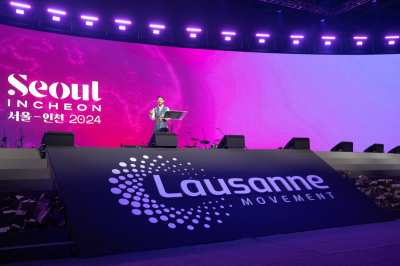The persecuted Church and the power of a faithful witness

The new Lausanne ‘State of the Great Commission’ briefing reports that, “State restrictions on religion have growth throughout the world. State support for Christianity has declined” and “Today more than 360 million Christians worldwide suffer high levels of persecution and discrimination for their faith.” It adds, “the rising tide of violence targeting Christians shows no sign of abatement.”
How does this persecution manifest itself? Sometimes it takes softer forms such as anti-conversion or anti-blasphemy, and apostasy laws, or digital surveillance, and social ostracism. But too often around the world it is showing itself through attacks on churches, church burnings or demolition, home burnings, physical assault, arrests, imprisonment, kidnapping, rape, torture, etc. The Lausanne report estimates that “312 million Christians in 76 countries suffer extreme levels of violence, a figure that has doubled over the past 30 years.”
This past week at the Lausanne Congress we’ve heard story after story from or about the persecuted church. We heard of crackdowns in India and China, imprisonments in Iran. We learned more about repression in North Korea. And we heard too many stories of Islamist terror against Christians in sub-Saharan Africa.
The top ten nations with the worst rankings for persecuting Christians include North Korea, Somalia, Yemen, Eritrea, Libya, Nigeria, Pakistan, Iran, Afghanistan, and Sudan.
I found it interesting that the ‘State of the Great Commission’ listed the United States, not in the low, but now in the medium, category in terms of government restrictions with social hostilities on the rise through identity politics. There is greater pressure to conform to non-Christian agendas, hostility to Christian ideas, limits of expression, etc. In neighboring Canada we have seen a rash of church burnings.
What is fueling all this? The report was weakest in answering this question. My assessment: depending on the location, it could be the forces of secularization, the imposition of statism, or some form of political or religious radicalism.
Yet intermixed with all this, we’ve heard the resolve of so many Christians in the suffering church to be faithful witnesses in the midst of persecution. Sometimes, as legal restrictions mount, this witness will have to take new forms: lifestyle evangelism, interfaith dialogue, and other under-the-radar, innovative ways to share the gospel.
They reminded the in-seat audience of 5,000 that the persecution of Christians has existed from the beginning of the Church. Jesus himself warned that it would be inevitable. They told us not to forget the testimony of those who have been martyred. They noted how the early church and other Christian traditions have done a better job at this than evangelicals. They also reminded us that it is not just Christians who are persecuted for their faith. And we must speak out for all those who suffer such persecution.
This was a key theme. It is the responsibility of the global church to stand with the persecuted church and against injustice. They asked us to do this by promoting religious freedom globally. The report spoke of being involved with democratic movements that push back against autocratic or totalitarian rule. They encouraged education in human rights so that we understand the international legal system and protections that are in place. They even mentioned the importance of documenting violations of religious liberty.
Finally, some of those who spoke reminded us that persecution is not the end of the story. It is part of the story, but not the whole story. This tribulation will end when Christ returns to reign. As Revelation 2:10 says, “a crown of life awaits those who are faithful, even unto death.”
Dr. Donald Sweeting serves as Chancellor of Colorado Christian University.




























